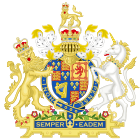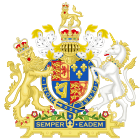Hollow Sword Blade Company facts for kids
The Hollow Sword Blades Company was a British company started in 1691. A goldsmith named Sir Stephen Evance created it. Its first goal was to make special swords called "hollow-ground rapiers."
In 1700, a group of business people bought the company. They used its name to act like a bank. At that time, the Bank of England was the only official bank in England. So, others had to find clever ways to do banking. The Hollow Sword Blades Company became a step towards creating the South Sea Company. This new company hoped to take over the government's banking from the Bank of England.
Who Started the Company?
Sir Stephen Evance was a goldsmith. His father was born in New England, but Stephen set up his business in London. Sir Stephen was interested in more than just metalwork. He tried to find sunken treasures using a diving machine. He also mined for lead and looked for minerals in Canada. He even joined a fishing business in Ireland.
Sir Stephen Evance was the leader of the Hudson's Bay Company from 1692 to 1696 and again from 1700 to 1712. He first bought shares in the Hudson's Bay Company in 1684. He was a good friend to the company. He often helped them get money and other favors. For his help, he received a gift of 50 "Guineas" to buy horses for his coach. Sir Stephen never married or had children. His niece, Hester Child, inherited his large estate after he died.
How the Company Began
In 1691, a war started between France and England. This war stopped the import of popular hollow-ground swords from France. This created a chance to make these swords in England. Sir Stephen Evance arranged for skilled metalworkers from France, called Huguenots, to come to Britain. They would make the swords.
On October 13, 1691, the company received an official charter. It was called the 'Governor and Company for Making Hollow Sword Blades in England'. The company set up its workshops at Shotley Bridge in Durham. To get the charter and two patents, the company had to loan the government £50,000. Sir Stephen Evance and Sir Francis Child provided this money in August 1692.
Evance became the first governor of the company. The company could buy land and issue shares without limits. The company made swords. Its charter also allowed it to stop foreign hollow swords from being imported. After King William III died in 1702, Evance was less involved with the company. One of the company's sword makers, Herman Mohll, continued to make swords at Shotley. His company later became Mole and was bought by Wilkinson Sword in 1922.
The Company's Banking Business
The Hollow Sword Blade Company was sold and moved to London. Its new secretary, John Blunt, was a lawyer who dealt with business and money. The new leader was Elias Turner, a goldsmith. He brought money and experience. The deputy leader was Jacob Sawbridge, who came from a business family. The fourth partner was George Caswall, whose family had been important in politics for a long time. Caswall was a partner with another goldsmith, Brassey, and focused on finance.
The writer Daniel Defoe described them as very clever businessmen. Their main goal was to get into the banking business. The Bank of England had a monopoly on handling government money and loans.
Quick facts for kids Estate in Ireland of the Company for making Hollow Sword Blades in England Act 1703 |
|
|---|---|
| Act of Parliament | |

|
|
| Long title | An Act to discharge the Governor and Company for making hollow Sword Blades in England, of the Sum of Eighteen Thousand Eight Hundred Sixty-four Pounds, Seven Shillings, One Penny Half-penny, by Mistake overcharged in the Purchase-money for several forfeited and other Estates and Interests in Ireland, purchased by them. |
| Citation | 2 & 3 Ann. c. 21 (Ruffhead: c. 12) |
| Dates | |
| Royal assent | 24 February 1704 |
| Other legislation | |
| Repealed by | Statute Law Revision Act 1867 |
|
Status: Repealed
|
|
In 1703, the company bought large areas of land in Ireland. These lands had been taken from people who supported King James II. The company bought estates in many counties, including Mayo, Sligo, Galway, and Cork. However, within about 10 years, the company sold most of its Irish lands.
The company used a clever trick to pay for this land. It was similar to what the Bank of England had done when it started. The Hollow Sword Blades Company issued its own shares. It offered to trade its shares, valued at £100 each, for £100 of government debt. The government was happy to accept its own debt as payment for the land. This meant no actual cash was needed for the deals. At that time, government debt could only be sold for £85 for every £100 of its value. So, this deal offered a better price for those holding the debt. The land became the company's property. The company would then pay out money to its shareholders from the rent it collected on the land.
The company also started offering mortgages to people who wanted to buy Irish land. They accepted cash deposits and issued their own notes. The Bank of England noticed this. They told the government that the Hollow Sword Blades Company was breaking their banking monopoly. However, the government did not act. They knew they had a good deal and did not want to ruin it.
The Bank of England's official charter was set to end in 1710. They wanted to renew it. Other groups tried to stop this. They offered to lend money to the government instead. The Bank of England responded by lowering its interest rates. It managed to renew its charter until 1732. The new terms were stricter to prevent other companies from acting like banks.
| Forfeited Estates Act 1707 | |
|---|---|
| Act of Parliament | |

|
|
| Long title | An Act for limiting a Time to Persons to come in, and make their Claims to any of the forfeited Estates, and other Interests in Ireland, sold by the Trustees for Sale of those Estates to the Governor and Company for Making Hollow Sword-Blades in England, and divers other Purchasers. |
| Citation | 6 Ann. c. 61 Ruffhead c. 34 |
| Dates | |
| Royal assent | 1 April 1708 |
| Other legislation | |
| Repealed by | Statute Law Revision Act 1867 |
|
Status: Repealed
|
|
The Hollow Sword Blade Company faced more problems. People started to argue over who owned the land in Ireland. Relatives of those whose land was taken claimed it back. Others said they had bought it from the first owners. A law was passed in 1708 to set a time limit for these claims. By then, the company's shares had dropped in value.
Sources
- Hoppit, Julian. (2002) "The Myths of the South Sea Bubble," Transactions of the Royal Historical Society, (2002) Vol. 12 Issue 1, pp 141–165 in JSTOR
- Paul, Helen Julia (2010) The South Sea Bubble: an economic history of its origins and consequences, Routledge Explorations in Economic History, Routledge, London.
 | Leon Lynch |
 | Milton P. Webster |
 | Ferdinand Smith |

